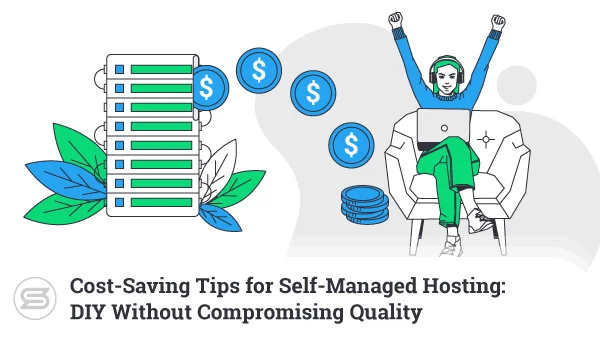Reliability is one of the most important aspects of any web hosting service. You pay your host money not only to ensure your business is accessible 24/7 but also to guarantee excellent loading speeds regardless of the time of day.
Hosting providers will tell you that you can get a reliable service with any of their plans, but the reality is, some types of hosting are inherently more stable than others in terms of both performance and uptime.
Let’s examine the different services in more detail and determine which ones are the best.

Shared Hosting Reliability
If you’re new to the world of web hosting, you’ll look at all the available options and see that the shared hosting plans are considerably cheaper than the other services.
But does that make them less reliable?
In a shared hosting scenario, you have one physical server accommodating dozens of individual accounts. As an account owner, you have your own folder on the server that only you can access. You also get a control panel to manage files, databases, email and FTP accounts, backups, DNS records, etc.
The ability to put so many people on the same physical server lets hosting providers price the low-end shared plans at just a few dollars per month. Because they are so affordable, they’re often preferred by website owners trying to get their business going on a shoestring. However, they do have their disadvantages.
All shared accounts on the server use the same hardware resources. Hosts do have measures in place to ensure a single account doesn’t take up too much of the available hardware power, but ultimately, the performance of your website depends on how much load other users put on the host machine.
If one or several websites are experiencing traffic spikes at any given time, the server may be overloaded, compromising the loading speeds for everybody.
The problem could be exacerbated if your host puts too many people on the same server. It’s a dishonest practice called overselling, and some hosts engage in it to maximize their profits. The result is a constantly overloaded server and websites that don’t load quickly enough.
You can never really know what other people on the shared server are up to, which may be a problem.
For example, it is completely feasible to imagine that one of your neighboring websites has fallen into the hackers’ sights. If they launch a DDoS attack against it, they will be directing a vast amount of junk traffic not just to the targeted website but to the underlying shared server, as well. If the attack is large enough and the host doesn’t take timely actions, the entire server could go down, knocking offline all the projects hosted on it.
There are yet more potential issues. While you are using your hosting account to grow your business, others may be utilizing theirs for more nefarious purposes like sending spam.
This is a concern for you because every email sent from the shared server comes from the same IP. If one of your neighbors starts sending a large volume of unsolicited messages, the spam filters may blacklist the server’s IP, blocking your email communication, as well.
Of course, these are all scenarios that won’t necessarily affect you. A good host will implement measures to prevent some of them and act quickly to mitigate the damage when completely eliminating the danger is impossible.
Nevertheless, certain characteristics of the shared hosting setup make it less reliable than other, more expensive web hosting services.

Self-Managed VPS Hosting Reliability
Priced slightly higher than shared plans, self-managed virtual private servers (VPSs) give you a completely different setup. Once again, hosts optimize their hardware utilization by situating multiple user accounts on the same physical server or cloud cluster.
However, this time, they use virtualization technology to isolate individual accounts into separate virtual machines (VMs). Instead of a single folder, you get an entire virtual server with its own filesystem, hardware resources, and IP.
There are no limits on the number of websites you host on your VPS, and it’s up to you to choose and install the software you’ll use to manage them. Your virtual server is completely isolated from the rest of the accounts, so you don’t have to worry about anyone else using your hardware resources or affecting your project’s performance.
You also have your own IP address. Only you will be using it for your email communication, so it’s unlikely to end up on any blocklists. Out of the box, it’s a much more stable platform because far fewer things are outside your control. However, having everything in your hands can have its drawbacks.
A self-managed VPS is a bare-metal machine with an operating system and not much else. You are responsible for installing all the required software and configuring it for the best possible performance, security, and reliability.
It’s not just the initial configuration you need to worry about, either. As a self-managed VPS owner, you’re responsible for keeping all software components on your server up-to-date, and you can’t expect any help from your host in case something goes wrong.
You have root access to the machine, and most of the work related to optimizing your VPS is done through the command-line interface.
It’s hardly the most beginner-friendly setup, and it’s usually sought after only by experienced site owners who want to create a custom hosting environment. It’s a lot of technical work, and even the tiniest mistake could compromise the performance of the entire server.
In other words, while a self-managed VPS is a much more reliable setup than a shared hosting account, you need to know what you’re doing if you want to have stable performance and excellent uptime.
Thankfully, you can get the extra security and speed of a VPS without worrying about the sysadmin stuff.

Managed VPS Hosting Reliability
With a managed VPS, you get the same basic setup. You have a virtual server with guaranteed resources and a dedicated IP reserved specifically for you and your project.
However, you don’t need any technical skills or advanced system administration knowledge to run your account. Unlike a self-managed VPS, you get a virtual machine ready to host your website. In addition to an operating system, your provider will install all the software required for running projects.
You get an admin panel where you create accounts for your individual websites. To ensure a single website can’t overload the entire server, you have real-time resource usage statistics, and you can set quotas.
To ease the process of launching a website, a control panel dedicated to each account comes with a one-click installer for setting up content management systems like WordPress, utilities for easily uploading, downloading, and editing files, tools for FTP and email accounts, etc.
It all happens through a point-and-click interface in a browser window.
You have the freedom to start work on your project immediately, and you can focus 100% of your attention on it. Your host’s technical experts handle the initial setup and ongoing server maintenance. If something goes wrong, a technical support team should be on hand to resolve any issues and guide you to the right resources in case action is required on your end.
Because you are delegating so much of the work related to maintaining the server to your host, managed VPSs tend to be more expensive than self-managed ones. However, you could also argue that they are more reliable.
The virtualization layer provides you with the power you need to ensure excellent performance and security, and giving most of the technical tasks to the experts minimizes the chances of something going wrong.


Dedicated Server Hosting Reliability
A dedicated server (DS) is similar to a virtual private server in that you get a dedicated IP and guaranteed resources reserved specifically for your project. The difference is, with a dedicated server, you get to use an actual physical machine instead of a virtual one.
Your server is stored in a carefully controlled environment in a data center, where it’s connected to the internet through a blistering broadband connection, with a backup network and power supply to minimize the chance of website outages.
In other words, keeping a server online is neither easy nor cheap. This, predictably, is reflected in your hosting bills.
Although you can theoretically get a dedicated server for less than $100 per month, solutions that give you adequate power run well into the three-figure range and can sometimes exceed $1,000. But what exactly do you get for this sort of money?
Historically, dedicated servers are considered the most powerful hosting solutions out there. In the past, dedicated servers were the only alternative to shared plans, and they were indeed much more suitable for high-traffic websites.
However, the appearance of VPSs mixed things up a little bit. People continue to accept VPS hosting as the middle ground between shared plans and a dedicated server, but the truth is, their range is much broader.
Virtualization and cloud technology has progressed a lot over the years, and many of the limitations that existed in the past have now been eliminated. Virtual servers are infinitely scalable, so you can start small and build your way up until you have a solution that is more powerful than an actual DS.
This precise scalability is another reason for the diminishing popularity of dedicated servers. If you need to upgrade a VPS, all you usually need is a couple of clicks. If your dedicated solution is no longer suitable, you need to move the entire website from one physical machine to another.
When it comes to reliability, things are not completely clear-cut, either. While VPS solutions are often situated on powerful cloud clusters that can take up the slack in case one of the machines fail, with a DS plan, you rely on the correct functionality of a single server. If it malfunctions, your website goes down.
You also need to bear in mind that most DS plans are self-managed, so it will be up to you to configure and optimize the server – a task beyond the technical capabilities of many people.

Conclusion
The truth is, any hosting service can be reasonably reliable if the provider has done a good job of setting up and configuring the underlying hardware and software. However, some solutions are more stable than others.
For example, thanks to the nature of its setup, shared hosting is more prone to outages and periods of compromised performance. It’s not really suitable for projects attracting any sort of sizable traffic, either, which is why VPSs are by far a better environment for building and growing a successful business. The virtualization technology allows you to have guaranteed resources and a dedicated IP, making for a more stable and consistent hosting service.
The scalability means you don’t have to worry about what will happen after your site outgrows the server. Last but not least, with a managed plan, you can efficiently utilize your allocated resources without doing any technical work or paying truckloads of money for a dedicated server.
FAQ
What is reliable web hosting?
The key metrics you need to look for when estimating a hosting service’s reliability are uptime and loading speeds. You want to have your website online 24/7, but you also want it to display consistent performance at all times.
How do I choose the best web hosting service?
You need to look at several things when picking a hosting plan for your website. The budget is an obvious consideration, but you also need to go through the different options and think about the time you’re willing to commit to the project and your technical skills.
What OS do most servers run?
Most web hosting servers run on Linux for a couple of very good reasons. For one, the open-source operating system is more stable than its competitors under heavy load. What’s more, many of the technologies powering your website are either developed to run exclusively on Linux or are better suited to this environment.
Last but not least, Linux is completely free to use. If you pick a self-managed hosting account, you will need to interact with the operating system quite a lot, so make sure you only choose it if you have enough experience.



